#✘჻ & HUEY.
Explore tagged Tumblr posts
Photo
L'únic Donald que respecte










Happy Father’s Day to Donald Duck
2K notes
·
View notes
Note
Well, Huey, even though you don't remember, that particular attempt of time traveling to stop the kidnapping creates a paradox where you never existed, and thus, never could have stopped it. It is pretty similar to the Grandfather paradox.

641 notes
·
View notes
Text


Now I had to do the rest of the four main kids and Magica in Holiday pajamas with possibly more coming...
#donald duck#daisy duck#huey duck#dewey duck#louie duck#webby vanderquack#lena sabrewing#violet sabrewing#magica de spell#morgana macawber#ducktales#ducktales reboot#huey dewey and louie#team magic#donsy#ducktales fanart#ducktales fan art#ducktales 2017#duckverse#christmas#winter#holiday#fan art#fanart#drawing
31 notes
·
View notes
Text
Art dump
Au I hope to expand on


Sillies







That moment when your dads gay

Commissions
#animaniacs#animanics 2020#ducktales#ducktales 2017#a goofy movie#an extremely goofy movie#yakko#yakko warner#wakko#wakko warner#max goof#huey duck#louie duck#yakko x max#yax#wakko x louie#wakkie#huoyd#crackship#crossover crackship#aged up characters#yax fankids#wakkie fankids
29 notes
·
View notes
Text
😊
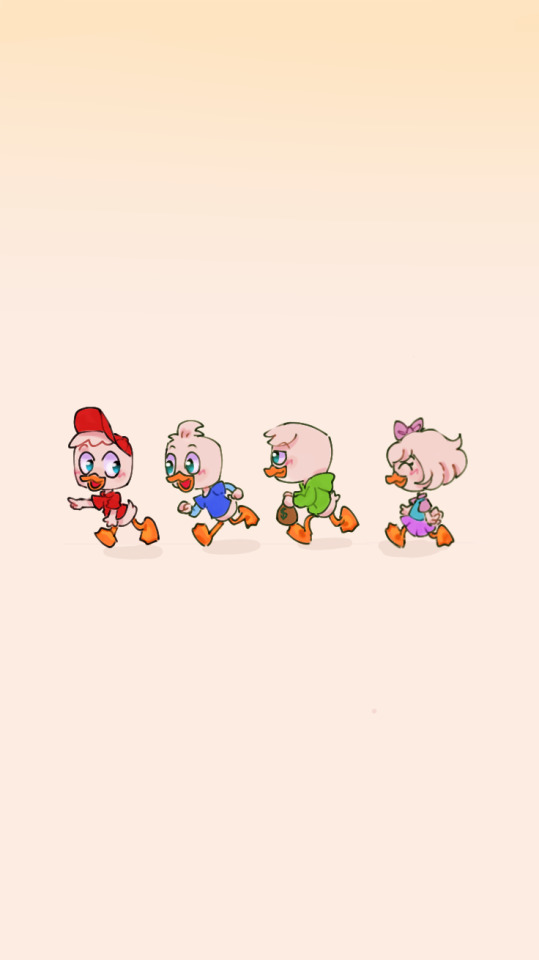
everyday they're out there making ducktales!
625 notes
·
View notes
Text
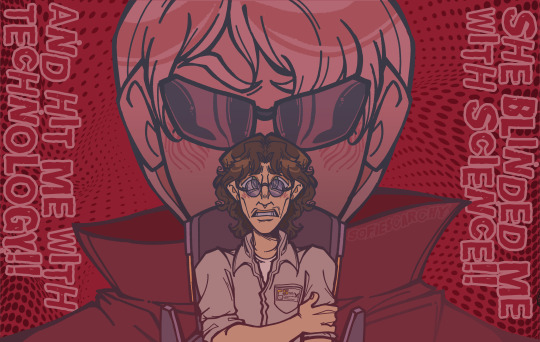
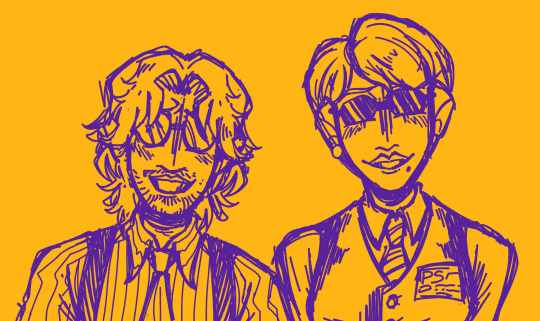
my favs 😋
35 notes
·
View notes
Text
My designs for smol triplets and VERY tired dad Donald

I've had the headcanon that Louie had glasses when he was younger for a long while now
#Louie duck#Dewey Duck#Huey Duck#Donald Duck#Ducktales#Dt17#Ducktales 2017#My designs#My art#fanart#Old art
25 notes
·
View notes
Text
🙃

❗️❗️❗️
389 notes
·
View notes
Note
Huey ❤️

that’s a dilute black (blue) mackerel tabby !
107 notes
·
View notes
Text
Scrooge was right, Minecraft was a gold mine!

Shame he gave it up for a copper mine, which he gave up for his family, which he gave up for money (that he didn't give up).
#that's an over simplification#but also correct#uncle scrooge#scrooge mcduck#donald duck#huey dewey and louie#don rosa#carl barks#the life and times of scrooge mcduck#disney#comics#disney comics#comic books#minecraft
20 notes
·
View notes
Text
North + Chicago Holiday, Pt. 1
(Stacked Rewatch / Timestamp Roulette Art Challenge)

Busy week, tired fanartist; I did a quick oil pastel landscape sketch of the last scene in North, and while the ep next in line in the stacked rewatch, Chicago Holiday Part 1, had some very colorful art opportunities, I could only manage a tiny (10 x 12 cm) doodle of Welsh and the Duck Boys on the back of a used envelope with colored pencils and fibre-tip pens, accompanied by a million yawns from yours truly during the 10 minutes it took - I should've gone to bed already, but I wasn't going to give up my at-least-one-sketch-per-episode goal yet.

#due south#due south fanart#my art#timestamp roulette art challenge#ds stacked rewatch#harding welsh#louis gardino#jack huey#some other guys#*#ds north#ds chicago holiday
20 notes
·
View notes
Text
Hi I interrupt this chaos to talk about the genius of

So, for those who can’t name every episode of the Ducktales reboot, this is from a montage that takes place in the dreamscape. The original is of the three Duck triplets, Huey, Dewey and Louie, presenting Phooey Duck, who is not real. He’s a made-up triplet, stemming from the joke that in the original Donald Duck and Scrooge McDuck comics, sometimes the artists would draw an extra triplet, since they were all identical.
In the context of this image, that would make this Alastor, the Onceler and Sans presenting Sexyman Bill Cipher, who doesn’t exist
The thing is, Sexyman Bill Cipher DOESNT exist. In the canon of Gravity Falls, Bill Cipher is a triangle and only a triangle, unless possessing a nerdy twin who doesn’t shower.
Therefore, this is genius please give this legendary creator a prize
🏆
here is your price
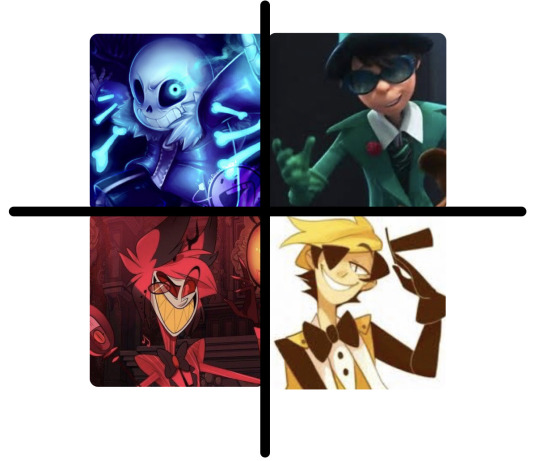
79K notes
·
View notes
Text
Billy Pilgrim has come unstuck in time or, what was on Daniel Molloy’s bookshelf in 1973?
Inspired by @volkswagonblues’ and @islandbetweeenrivers’ reading list of texts providing historical and cultural context for Daniel Molloy as journalist in the 1970s and 80s
This is, pretty much in its entirety (bar one or two references throughout the show and its extant material), assumptions I’ve made about the character. But, also: it’s my blog so I can do what I want. Dating works is somewhat inconsistent, as I opted for the date a piece was published in a collection or translation rather than when it first appeared in print if it seemed more realistic to have been acquired in that format.
I’ve found the archives of Rolling Stone and Playboy have been helpful in piecing together a who’s who of literary life in the late 1960s and early 1970s, especially for a intellectually precocious teen from suburban Modesto, CA transplanted into the centre of countercultural life in Haight-Ashbury.
From what I can gather, being born in ‘53 means Daniel was just a year shy of being drafted to fight in the Vietnam War, an experience that would have profoundly effected his peers just a year or two older than him. Throughout his teenage years, he’s got the spectre of the possibility of being drafted hanging over his head. It reminds me of pop-inspirational phrases like “you only live once,” which really puts his risk-taking, thrill-seeking behaviour into the perspective of yeah, this is someone who is trying to live life to the fullest every second of every day because the possibility of being drafted means that he might not make it past twenty. (Unfortunately! Louis & Armand also mean he might not make it past twenty either xoxoxo)
However, crucially, he did narrowly miss the draft, and despite that it would be horrible, I think there’s an acute sense of having missed out on this profoundly altering experience as well. Moving to Haight-Ashbury, he’s six years late to the Summer of Love ‘67, and the rose-tinted image of hippies, peace, and love is replaced by the grittiness of speedfreaks and serial killing (the Zodiac Killer being active throughout 1969, when Daniel would have been sixteen). He’s made it to San Francisco just a few years after its golden era, and i think this makes him even more determined to live, more determined to chase living life in order to make up for that, yknow?
i think the themes that he’s drawn to when reading are:
new journalism, and particularly when the journalist-as-rockstar persona is inserted into said reporting
the provocative, bacchanalian pursuit of pleasure, whether it be sex, drugs, or rock ‘n’ roll — and often sex mixed with violence in a way that is neither straightforward nor legible
travelogues and adventure stories that reflect his restlessness, particularly which let him romanticise far away places with thriving literary scenes like Paris and New York
a general aura of repressed queerness and crises of american masculinity (Capote, Tennessee Williams, Ginsburg, Hemingway)
war narratives as a vehicle for cold war/red scare anxieties
Without further ado, the actual book list:
Periodicals
Playboy magazine. People have long joked about reading Playboy for the articles, but it is the one piece of literature teenage Daniel is in-universe confirmed to have readily accessible, so I’m running with “Danny actually does read it for the articles, though” (and anyways, it’s Diana Ross’ Rolling Stones cover issue from Feb 1 1973 that he jerks off to). In 1973 alone, Playboy featured interviews with playwright Tennessee Williams; Huey Newton (co-founder of the Black Panther Party); news anchor and journalism’s elder statesman Walter Cronkite; science fiction novelist Kurt Vonnegut; and Pulitzer Prize-winning New York Times Vietnam war correspondent David Halberstam. Other Playboy interviews of possible interest: Fidel Castro, Orson Welles, Michael Caine (1967); Norman Mailer, Truman Capote, sexologists William H. Masters and Virginia E. Johnson, Paul Newman (1968); Martin Luther King Jr., Marshall McLuhan, Allen Ginsberg (1969). Also of note: between 1969 and 1971, Playboy was publishing faked letters to the editor that eventually developed into the Illuminati conspiracy theories.
In terms of reporting from major national newspapers in circulation, significant stories that come to mind are the New York Times publication of the Pentagon Papers (1971) and Bob Woodward and Carl Bernstein’s Watergate investigations for the Washington Post (1972-73). It’s harder to gauge the circulation of underground newspapers like the Berkeley Barb (CA) and the Village Voice (NY) but its entirely likely that a resourceful and enterprising young reader with a point of view in Modesto, CA could get their hands on a copy.
Prose, Fiction & Nonfiction
The Little Red Book by Mao Zedong. At Berkeley, The Black Panthers would raise money by selling copies bought in bulk at markup to students. Absolutely makes sense that daniel would acquire (and actually read) a copy. Growing up in the wake of McCarthyism/Red Scare nonsense def makes me think he would see flirtations with communism as provocative and cool/edgy, but never back that flirtation up with follow-through.
The Hell’s Angels, a Strange and Terrible Saga (1966) by Hunter S. Thompson. Throughout the 1960s and 70s, the Hells Angels had a sizeable presence in San Francisco and Oakland — from what I can find they lived dead centre of Haight-Ashbury up until ‘69 if not later. As a teenager in Modesto, Daniel would have been geographically quite close (if not actually in attendance at) the 1969 Altamont Festival Rolling Stones performance where a teenage concertgoer was stabbed to death by a member of the Hells Angels.
Fear and Loathing on the Campaign Trail in ‘72 (serialized in Rolling Stone magazine) by Hunter S. Thompson. The quintessential text to understand ‘73 Daniel, imo. Fuck Nixon, Fuck Reagan, fuck the National Guard killing student protestors. Thompson’s other works include “The Kentucky Derby is Decadent and Depraved“ (with illustrations by Ralph Steadman) and Fear and Loathing in Las Vegas.
The New Journalism: An Anthology (1973) edited by Tom Wolfe. In addition to excerpts of Hunter S. Thompson’s work already discussed above, the anthology collects In Cold Blood (1965) by Truman Capote, Slouching Towards Bethlehem (1968) by Joan Didion, The Electric Kool-Aid Acid Test (1968) by Tom Wolfe, and Armies of the Night (1968) by Norman Mailer. I won’t do justice to summarizing the New Journalism here, but it’s def important.
Slaughterhouse-Five (1969) by Kurt Vonnegut. The quintessential Daniel Molloy fiction novel, to me. Exploration of post-traumatic stress disorder through an encounter with time travelling science fiction aliens. Takes on a new resonance for Daniel when he’s dealing with his own ptsd post-1973. Vonnegut’s other works include Cat’s Cradle (1963) and Breakfast of Champions (1973). On the subject of Cold War anxieties, there’s Catch-22 (1961) by Joseph Heller. I don’t have much to say about it as I’ve not read it yet, but it feels like the kind of thing teenage Daniel living in Schrödinger's draft call-up would take to. Maybe also John Le Carré’s The Spy Who Came in From the Cold (1963) and The Looking Glass War (1965), the latter particularly for the palpable air of repressed homoeroticism and WWII nostalgia/Cold War anxiety.
A Moveable Feast by Ernest Hemingway (published posthumously in 1964). Daniel absolutely spent his teenage years romanticising being an expat America writer in the Paris literary scene. Substance use, war, and crises of masculinity throughout. In addition to Hemingway’s reporting on the Spanish Civil War (1937-1938), other works include novels The Sun Also Rises (1926), A Farewell to Arms (1929), and For Whom the Bell Tolls (1940).
George Orwell: Down and Out in Paris and London (1933), Burmese Days (1934), Homage to Catalonia (1938), Animal Farm (1945), Nineteen Eighty-Four (1949); and essays ”Books v. Cigarettes“ (1946), ”Decline of the English Murder” (1946), “Politics and the English Language” (1946), and “Why I Write” (1946). I think Orwell’s nonfiction writing would appeal to Daniel more than his fiction, especially when at the right age to romanticize the poverty-tourism of Down and Out. Also bonus points for Paris.
On the Road (1957), The Dharma Bums (1958), and The Subterraneans (1958) by Jack Kerouac. In particular, The Subterraneans is based on Kerouac’s interracial relationship with an African American woman in the 1960s. He’d also probably read Naked Lunch (1959) by fellow Beat poet William S. Burroughs.
Lolita (1955) by Vladimir Nabokov, both for its salacious notoriety and its unreliable narration. Like myself, Daniel feels like the kind of teenager who would read Lolita at sixteen as a provocation in a conservative environment, but come away genuinely enjoying it.
Poetry, Drama, Misc
Howl and Other Poems (1956) by Allen Ginsberg, particularly the edition published locally by San Francisco’s City Lights Books Pocket Poets series.
A series of miscellaneous titles I’d group together as “Daniel Actually Did the Assigned Reading in High School English Class” — The Great Gatsby by F. Scott Fitzgerald, Catcher in the Rye by J. D. Salinger (“Get off that bench, brother”), Of Mice and Men by John Steinbeck, and “The Second Coming” by W. B. Yeats. Most significantly, I imagine high school is where he’d be exposed to the work of American playwrights Tennessee Williams and Arthur Miller. The Glass Menagerie (1944), A Streetcar Named Desire (1947), and Cat on a Hot Tin Roof (1955) by Tennessee Williams. In the context of his relationship with Louis, I think it’s fun to imagine he’s familiar with/attracted to the Southern Gothic by way of Tennessee Williams (again with the crises of masculinity, the spectre of war, the repressed sexuality). Williams and Death of a Salesman (1949) by Arthur Miller, present the life Daniel could have had ie. the alcoholic husband, housewife vacuuming on Valium, etc.
If there’s anything else anyone thinks I’ve missed, feel free to hit me with a reply or a dm or an @ or whatnot. stay freaky & support yr local library x
#tv series: interview with the vampire#daniel molloy#mine#this is more like a Rorschach test into what writing my iwtv fic looks like
56 notes
·
View notes
Text


Duckvember 2024 Day 11: Mechanical Duck
Featuring both gizmoducks and the duck mechanics!!
#huey duck#fenton crackshell cabrera#gizmoduck#daisy duck#donald duck#donsy#may duck#june duck#ducktales#may monday#ducktales reboot#ducktales fanart#duckvember#duckvember 2024#ducktales fan art#ducktales 2017#duckverse#ducktales huey#ducktales fenton#ducktales donald#ducktales daisy#ducktales may#ducktales june#fanart#fan art#drawing
33 notes
·
View notes
Text
AAAA I never thought about this but huey would literally be geeking out 😭😭
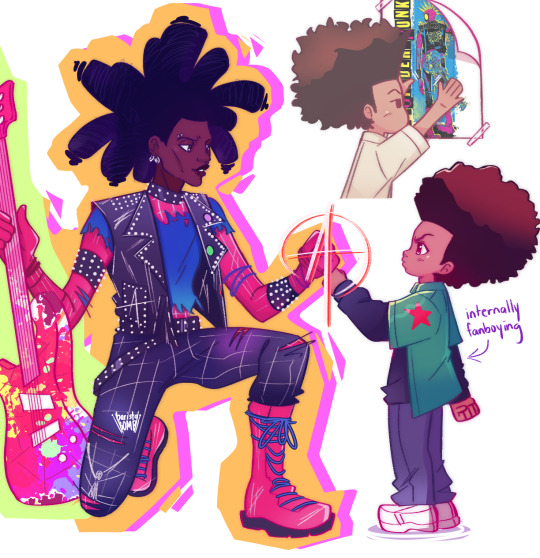
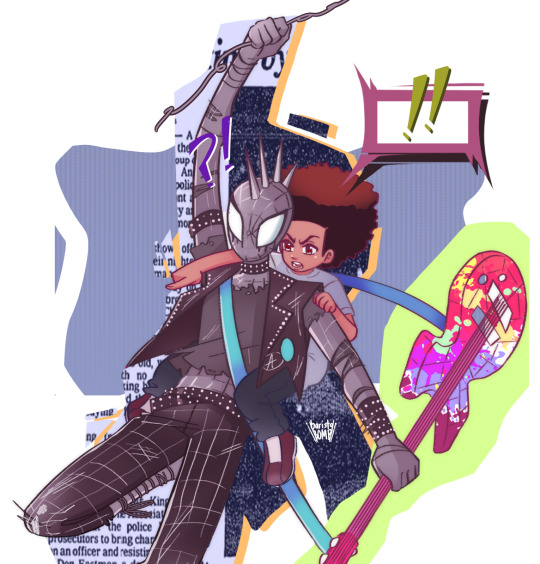
do you see the vision? Huey from the boondocks meeting Hobie…think about it!!
2K notes
·
View notes
